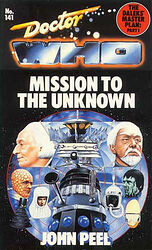
 |  |  |

 | Reviews for Mission to the Unknown |
|
 |  |  |
There are 2 reviews so far. To add a review of your own for this item, visit the voting page.
| By: | Quist, NZ |
|
| Date: | Tuesday 25 September 2007 |
|
| Rating: |    9 9 |
I know a lot of people seem to slate John Peel's writing but here he does us a service - mind you the original scripts are great too. This one bears up rather better than the second volume. Great stuff.
| By: | Leon Coward, Sydney, Australia |
|
| Date: | Thursday 28 January 2016 |
|
| Rating: |   10 10 |
If Doctor Who had Anthony Horowitz writing for it, I imagine it'd be not too dissimilar to "Mission to the Unknown" in terms of tone and the writing style (especially like Horowitz's writing for younger readers [such as his "Alex Rider" series] - the writing is to the point, and it helps keep up a nice pace).
This is the first part of "The Daleks' Master Plan" (the continuation being the novelisation "The Mutation of Time"). The overall gist is that the Daleks have formed a secret alliance with other galaxy rulers, and together they plan to conquer the universe. Mainly destroy earth, but they're thinking 'big' too. The Doctor more-or-less stumbles across their plans and has to work out how to scupper them. It's a pretty far-stretched story concept... That said, it lays the foundation for essentially a wartime/espionage space opera with secret information being traded, relationships turning on their head, covert operations, treason, and various political moves against one another.
The story aforementioned doesn't develop too much (as noted, there's the follow-on novel) but what it does do is develop the sense of character, scenario, and plot twists. Situations spiral out of control and its very much a chase story. It feels like a continual chessboard game, and you're continually waiting to see how the pieces behave - because you're not necessarily sure what piece is what, and on which side they are!
There were two really enjoyable aspects about this novel. The first is Peel's efforts in writing it with the mindset of colouring it with details from the "Whoniverse" as it developed decades later on television. Although the episodes (on which this book was based) were broadcast in the '60s, in this book there are references to the 'Draconian' empire and also the 'Movellans' -- races that were invented for episodes in the '70s.
The second aspect I really enjoyed was the structure of the story itself and how characters behaved, which is a credit to the original episode writers and production team. It is a contrast to the 2005 revived TV series. A companion sacrifices herself (I don't think there are any spoilers here) and there is no dramatic emotional music, no weeping, no tantrums, no farewell speeches... it just happens. And the Doctor can't do anything but say (essentially) "She did what she thought she had to" and they have to keep on going as they were (because the story isn't over - this is midway through the book!). I also appreciate the nuance given to the Daleks... they are far more intriguing than most other episodes and far more political (this is their 'hour' of a story, so to speak). Of note, there is a particular scene where some Daleks failure to capture the Doctor - they are declared 'failures as Daleks' and blown up by the other Daleks. (A far cry from the new series "Asylum of the Daleks" where Daleks cannot bear to kill another Dalek).
The thing that comes across strongly from these early Dalek stories-----this one especially----is you can't but help realise how strong post-war Britain and experience of wartime and wartime politics, influenced Doctor Who's writing and its success - the types of characters, scenarios, and its ability to resonate with audiences then. The stories were 'presented' in a palatable way, but the stories did not shy away from being mature in scope and giving harsh consequences for characters' actions.


